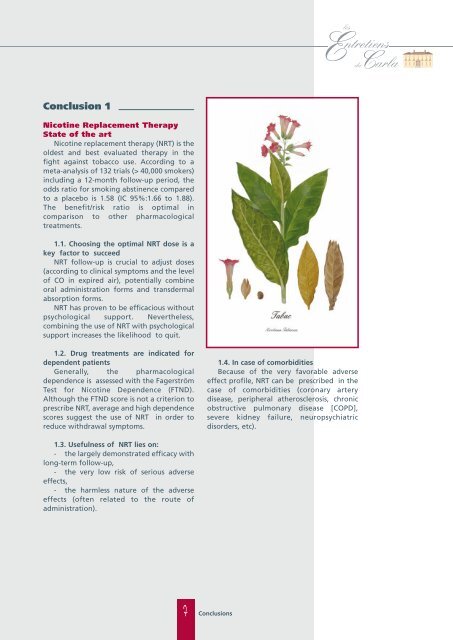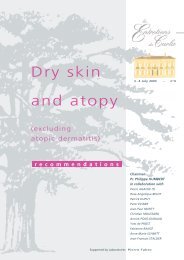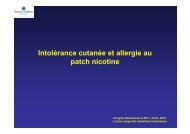Nicotine replacement therapy … - Carlos A ... - Entretiens du Carla
Nicotine replacement therapy … - Carlos A ... - Entretiens du Carla
Nicotine replacement therapy … - Carlos A ... - Entretiens du Carla
Create successful ePaper yourself
Turn your PDF publications into a flip-book with our unique Google optimized e-Paper software.
Conclusion 1<br />
<strong>Nicotine</strong> Replacement Therapy<br />
State of the art<br />
<strong>Nicotine</strong> <strong>replacement</strong> <strong>therapy</strong> (NRT) is the<br />
oldest and best evaluated <strong>therapy</strong> in the<br />
fight against tobacco use. According to a<br />
meta-analysis of 132 trials (> 40,000 smokers)<br />
including a 12-month follow-up period, the<br />
odds ratio for smoking abstinence compared<br />
to a placebo is 1.58 (IC 95%:1.66 to 1.88).<br />
The benefit/risk ratio is optimal in<br />
comparison to other pharmacological<br />
treatments.<br />
1.1. Choosing the optimal NRT dose is a<br />
key factor to succeed<br />
NRT follow-up is crucial to adjust doses<br />
(according to clinical symptoms and the level<br />
of CO in expired air), potentially combine<br />
oral administration forms and transdermal<br />
absorption forms.<br />
NRT has proven to be efficacious without<br />
psychological support. Nevertheless,<br />
combining the use of NRT with psychological<br />
support increases the likelihood to quit.<br />
1.2. Drug treatments are indicated for<br />
dependent patients<br />
Generally, the pharmacological<br />
dependence is assessed with the Fagerström<br />
Test for <strong>Nicotine</strong> Dependence (FTND).<br />
Although the FTND score is not a criterion to<br />
prescribe NRT, average and high dependence<br />
scores suggest the use of NRT in order to<br />
re<strong>du</strong>ce withdrawal symptoms.<br />
1.3. Usefulness of NRT lies on:<br />
- the largely demonstrated efficacy with<br />
long-term follow-up,<br />
- the very low risk of serious adverse<br />
effects,<br />
- the harmless nature of the adverse<br />
effects (often related to the route of<br />
administration).<br />
7<br />
1.4. In case of comorbidities<br />
Because of the very favorable adverse<br />
effect profile, NRT can be prescribed in the<br />
case of comorbidities (coronary artery<br />
disease, peripheral atherosclerosis, chronic<br />
obstructive pulmonary disease [COPD],<br />
severe kidney failure, neuropsychiatric<br />
disorders, etc).<br />
Conclusions






